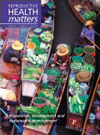-
Special Issue of ‘Reproductive Health Matters’ Highlights Integrated Development, Resilience Efforts
July 1, 2014 By Kate Diamond The May edition of Reproductive Health Matters is a special edition on sustainable development and reproductive health and rights. Our own Roger-Mark De Souza writes that in the quest to build resilience, development practitioners can learn from integrated population, health, and environment (PHE) programs.
The May edition of Reproductive Health Matters is a special edition on sustainable development and reproductive health and rights. Our own Roger-Mark De Souza writes that in the quest to build resilience, development practitioners can learn from integrated population, health, and environment (PHE) programs.PHE programs, which combine voluntary family planning with broader environment and livelihood interventions, encompass “the very characteristics identified as key to resilience,” writes De Souza, including social justice and equity, effective governance, local agency and ownership, and long-term engagement. De Souza points out four ways that integrating family planning into other development efforts besides PHE can help build resilience: it 1) helps diversify livelihoods; 2) bolsters community engagement; 3) builds new governance structures; and 4) positions women as agents of change. There is “an opportunity to package together a number of long-term, resilience-based solutions, increasing the effectiveness of each approach,” he concludes.
In the quest to build resilience, development practitioners can learn from integrated programsThere are other articles that touch on PHE, including one from Blue Ventures’ Vik Mohan, who has spoken at the Wilson Center, and several that discuss population and reproductive health in the context of the post-2015 global development agenda. Taken together, they underscore the benefit that cross-sectoral collaboration can bring to development projects, as well as the unique opportunity facing the international community as the Millennium Development Goals come to end next year.
TK Sundari Ravindran takes a step back from specific interventions and instead offers a critique of the international economic system, arguing that neoliberal globalization is the “insidious link” holding back progress on a range of key development goals, including universal health care, poverty, and food insecurity. The “speculative adventurism” of the financial system, the marketization of healthcare, and deregulation have combined to make food markets more volatile, public health services more scarce and costly, and forced countries to prioritize debt reduction over fully funding welfare programs, she writes. That combination means that in many countries there’s virtually no safety-net left for people in need – especially women – when crisis strikes.
Ravindran offers 11 recommendations to counteract these systemic problems, and like De Souza, notes that integration is key to getting the most out of development initiatives, especially when it comes to health services. “Siloed approaches that narrowly focus on one specific area, whether tuberculosis or family planning or HIV and AIDS, may result in inefficient investment of resources, especially in weak health systems – and may even result in their further weakening – and not achieve the desired goals.”
Sources: Reproductive Health Matters.
 A Publication of the Stimson Center.
A Publication of the Stimson Center.




